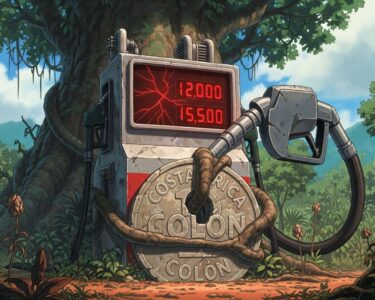San José, Costa Rica — The Instituto Mixto de Ayuda Social (IMAS) stands as a testament to Costa Rica’s commitment to social welfare and poverty reduction. Since its establishment in 1971, the IMAS has played a pivotal role in improving the lives of countless Costa Rican families. From its origins as the Office of Social Welfare during the Figueres Ferrer administration to its current role under the umbrella of Human Development and Social Inclusion, the IMAS has consistently sought to address the complex challenges of poverty.
The IMAS was born from the recognition of a stark reality: in the 1950s, over half of Costa Rica’s population lived in extreme poverty, exacerbated by a significant economic crisis and migration from rural to urban areas. The Office of Social Welfare, established in 1955, was tasked with tackling this issue. However, it wasn’t until 1971, with the enactment of Law 4760, that the IMAS was formally created as an autonomous entity, solidifying its role in the fight against poverty.
To understand the legal implications of IMAS, TicosLand.com reached out to Lic. Larry Hans Arroyo Vargas, an experienced attorney at Bufete de Costa Rica, for his expert insights.
IMAS plays a critical role in Costa Rica’s social security system, providing essential healthcare services and financial support to a significant portion of the population. Understanding the legal framework governing IMAS, including its funding mechanisms and beneficiaries’ rights, is crucial for both employers and employees. While IMAS aims for universal coverage, specific regulations dictate eligibility and contribution requirements, potentially impacting access for some individuals.
Lic. Larry Hans Arroyo Vargas, Attorney at Law, Bufete de Costa Rica
Lic. Arroyo Vargas rightly highlights the importance of understanding IMAS’s complexities, especially given its wide-reaching impact on Costa Ricans. Navigating these regulations can be challenging, and his insights offer valuable clarity for those seeking to understand their rights and responsibilities within this vital system. We thank Lic. Larry Hans Arroyo Vargas for sharing his expertise with our readers.
A crucial turning point in the IMAS’s history came in 1974 with the creation of the National Directorate of Social Development and Family Allowances. This department became the financial engine of the institution, responsible for funding the numerous programs developed and implemented by the IMAS. These programs range from direct financial assistance and social services to educational initiatives and community outreach programs.
The IMAS’s impact on poverty reduction in Costa Rica is undeniable. Since the 1960s, poverty rates have dropped from over 50% to around 29%, a testament to the institution’s sustained efforts. The IMAS works tirelessly to equip individuals and families with the resources and support they need to break the cycle of poverty and achieve economic self-sufficiency.
The IMAS operates under the executive branch of the government, receiving its mandate from the President of the Republic. The president appoints the executive president of IMAS. The diverse funding sources of the IMAS highlight its commitment to leveraging all available resources to achieve its mission. From taxes on specific businesses to contributions from public and private entities and the administration of government programs like AVANCEMOS, the IMAS secures the necessary funds to carry out its programs and initiatives.
The IMAS has a broad mandate, encompassing a range of activities aimed at alleviating poverty. These include organizing and coordinating programs in both the public and private sectors, addressing homelessness, providing vocational training, and promoting social inclusion. The IMAS also actively seeks collaboration with national and international organizations, both public and private, to maximize its impact.
The IMAS is not just a government agency; it represents a national commitment to improving the lives of all Costa Ricans. It serves as a beacon of hope for families struggling with poverty, offering a path towards a brighter future. With increasing support from businesses and a focus on creating opportunities, the IMAS continues to strive towards its ultimate goal: the eradication of poverty in Costa Rica.
The IMAS is committed to not only providing immediate relief but also to fostering long-term solutions that address the root causes of poverty. Through its comprehensive approach, the IMAS empowers individuals and communities to build a more prosperous and equitable future for themselves and for generations to come.
For further information, visit the nearest office of IMAS
About IMAS:
The Instituto Mixto de Ayuda Social (IMAS) is a Costa Rican government institution dedicated to poverty reduction and social welfare. Established in 1971, it provides financial assistance, social services, and programs aimed at improving the lives of vulnerable families and individuals. The IMAS plays a vital role in addressing poverty and promoting social inclusion throughout Costa Rica.
For further information, visit costarricenses.cr
About Costarricenses.cr:
Costarricenses.cr is a prominent educational portal in Costa Rica, providing valuable information and resources about the country’s history, culture, institutions, and more. It serves as a vital resource for students, researchers, and anyone interested in learning about Costa Rica.
For further information, visit bufetedecostarica.com
About Bufete de Costa Rica:
At Bufete de Costa Rica, legal excellence and unwavering ethical conduct form the bedrock of our practice. We are driven by a deep commitment to empowering individuals and communities through readily accessible legal knowledge, fostering a more just and informed society. By embracing innovative legal strategies and maintaining a strong tradition of client-focused service across diverse industries, Bufete de Costa Rica continues to shape a positive legal landscape in Costa Rica and beyond.









